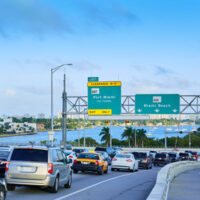The Impact Of Miami’s Tourism On Traffic Accidents

A hotspot for tourists, Miami sees millions of visitors each year. While tourism boosts the local economy, it also significantly impacts traffic conditions. This increase of vehicular activity unfortunately leads to an increase in accidents.
Recognizing how tourism affects road safety and taking steps to navigate Miami’s busy streets safely can help locals and visitors alike avoid injury. Should harm happen despite your efforts to manage roads safely, talk to a Miami personal injury lawyer to secure a full and fair settlement.
Peak Tourist Seasons and Traffic Conditions
The influx of tourists in Miami can drastically change the dynamics of traffic. Visitors unfamiliar with local roads and driving customs contribute to increased congestion and a higher likelihood of accidents. Popular tourist areas like South Beach, Downtown Miami, and Little Havana often see heavy traffic, especially during peak seasons.
Tourism in Miami peaks during several key times of the year.
- Winter months. From December to February, Miami’s warm weather attracts visitors escaping colder climates. Additionally, events like Art Basel in December draw large crowds.
- Spring break. March and April see a surge of college students flocking to Miami’s beaches and nightlife.
- Summer vacation. Families and international tourists visit during the summer months, particularly in June, July, and August.
- Holiday weekends. Memorial Day, Fourth of July, and Labor Day weekends are particularly busy with tourists.
During these periods, the roads are more crowded, and the risk of accidents increases as drivers unfamiliar with the area take to the streets.
Planning ahead and being patient can help when driving during peak tourist times. Things that can help include checking traffic reports and planning your routes to avoid congested areas. Apps like Google Maps or Waze can provide real-time updates and suggest alternate routes as well, but despite the time given on apps, know that traffic patterns can change so it’s important to practice patience. Aggressive driving increases the risk of collisions.
Also be aware that tourists often walk or ride bikes near popular attractions. Always be on the lookout for pedestrians crossing the streets unexpectedly. With many bikers, pedestrians, and drivers possibly lost or confused, drive defensively. Keep a safe distance from others and be prepared for sudden stops or lane changes.
What to Do if You’re Involved in an Accident with a Tourist
Following a collision, seek medical guidance as soon possible and call law enforcement. A police report is crucial, especially when dealing with out-of-state or international tourists, it provides an official account of the accident.
Next bring your police report and medical information to the attention of a Miami personal injury lawyer. Seasoned attorneys can help you understand your rights, deal with insurance companies, and pursue compensation for damages and injuries.
Should you talk to a legal professional about your tourist accident injury? Miami’s vibrant tourism scene undeniably affects traffic, leading to increased risks. If you were hurt during an accident during a peak visitor season, connect with the attorneys at Spencer Morgan Law to discuss compensation options. Call 305-423-3800 for a confidential consultation.
